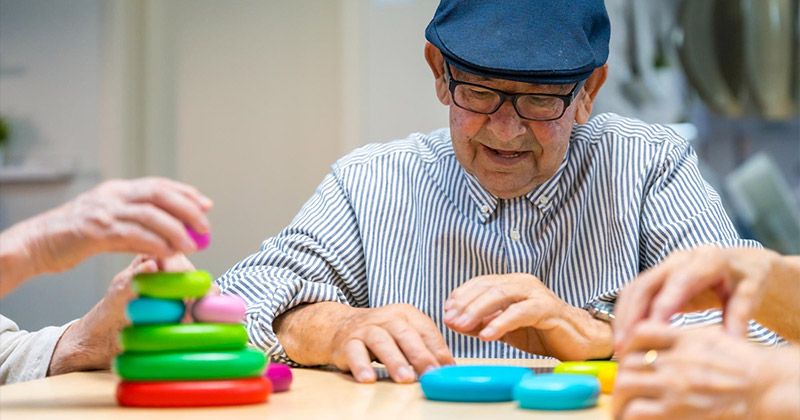Social interaction is vital for everyone, helping to alleviate isolation, depression, and anxiety. Regular communication supports cognitive health and emotional well-being. Choosing the righ...

A Guide to Sensory Products for Dementia Care
by Erin Barnes, Customer Success Advisor & Recreation Therapist
7-minute read
Individuals living with dementia may struggle to interpret complex sensory stimuli. However, they can still enjoy pleasant sensations and be distressed by unpleasant ones. Sensory stimulation offers numerous positive benefits for people with dementia.
Sensory products can play a valuable role in enhancing the quality of life for individuals living with dementia. By engaging the senses, these products can offer comfort, reduce anxiety, and support well-being throughout the dementia journey. This guide explores various sensory solutions designed to bring positive effects and improve daily life.
How Sensory Stimulation Can Help:
- Relaxation: Engaging the senses can create a calming environment, helping individuals feel more at ease.
- Focus and Cognitive Function: Sensory activities can offer cognitive stimulation and promote mental engagement.
- Recalling Happy Memories: Sensory experiences can trigger positive memories and bring joy and a sense of belongingness.
- Improved Mood and Self-Esteem: Incorporating sensory experiences into daily life is associated with a better mood and increased self-esteem, fostering a positive emotional state.
- Increased Social Engagement: Participation in sensory activities can facilitate connections with friends and family, enhancing social interactions and engagement.
Exploring Different Types of Sensory Stimulations
This guide introduces various sensory products designed to address common challenges faced by individuals with dementia.
Calming Companions: Soft and Weighted
Soft, weighted companions, such as plush animals and weighted blankets, can provide reassurance and a sense of security. For instance, the HUG offers a soft texture and weighted limbs, simulating a comforting hug, which can ease anxiety during personal care or nighttime.
Stress-Relief Tactility: Textured and Squeezable
Recommended for: Stress, anxiety, and restlessness.
Textured stress balls, sleeves, and fidgets offer a tactile experience that can reduce stress and promote relaxation. The Cuddle Ball, with its variety of textures, is an excellent option for soothing stress and restlessness.
Engaging and Entertaining: Interactive Games and Activities
Recommended for: Late stages of dementia, restlessness, engagement.
In the later stages of dementia, adapted games and activities can have immense benefits. They can provide an appropriate level of engagement. Products like the Twiddle offer engaging ways to address restlessness and provide appropriate stimulation.
Tactile Explorations: Fidget Boards and Gadgets
Recommended for: Restlessness, motor skills, brain stimulation.
Fidget boards and gadgets, such as the Wooden Portable Fidget Board, offer a versatile solution for keeping restless hands occupied while stimulating the mind and building motor skills. They offer various engaging features such as buttons, switches, and textures.
Rhythmic and Soothing: Musical and Auditory Aids
Recommended for: Sundowning, nighttime, relaxation.
Music and auditory stimulation can have a profound impact on relaxation. Solutions like the HUG provide a comforting hugging sensation with a calming heartbeat and calming music. The HUG allows to customize soothing playlists. They are great for addressing sundowning. They also promote relaxation during night agitation.
As we explore diverse sensory products, it’s important to note that not all items are suitable for everyone. People's preferences and history should guide the selection. Their comfort levels and specific responses should too.
Checklist for Introducing Sensory Items
Nurturing Well-being Through Personalized Care
Sensory products are powerful tools in dementia care, offering the potential to enhance comfort, engagement, and connection.
Conclusion
Caring for someone with dementia involves adjusting approaches to meet their evolving needs. As dementia progresses, a person’s needs and challenges may change, sometimes gradually and at other times more suddenly. By understanding the different benefits of these products and adopting a person-centered approach, caregivers and healthcare professionals can create a supportive environment tailored to individual needs. Connecting with the senses later on in the disease is often a valuable way to communicate with the person.


